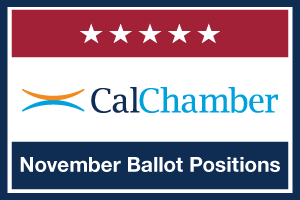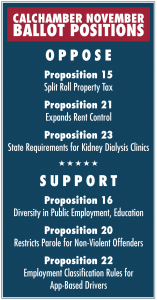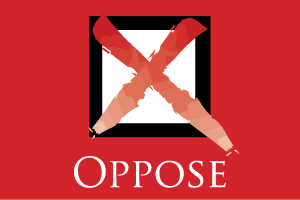 Election Day is less than a week away and this year, 12 propositions are on the ballot. Of those 12 measures, the California Chamber of Commerce has taken a position on six, including opposing a measure that will impose one of the largest tax increases in California history and backing a measure that will support the state’s economic diversity and maintain flexibility for workers.
Election Day is less than a week away and this year, 12 propositions are on the ballot. Of those 12 measures, the California Chamber of Commerce has taken a position on six, including opposing a measure that will impose one of the largest tax increases in California history and backing a measure that will support the state’s economic diversity and maintain flexibility for workers.
Vote-by-mail ballots must be postmarked by or before Election Day, Tuesday, November 3.
Sharing Information with Employees Is OK
The CalChamber encourages employers to share this information with their employees. Businesses are within their rights to do so—just remember: NO PAYCHECK STUFFERS, no coercion, no rewarding or punishing employees (or threatening to do so) for their political activities or beliefs.
For more guidelines on political communications to employees, see yesterday’s Top Story, “Informing Employees of Prop. 15 Drawbacks — OK to Explain.”
A brochure also is available at http://www.calchamber.com/guidelines.
Ballot Positions
 Following are brief summaries of the measures on which the CalChamber has taken a position and the reasons for that position:
Following are brief summaries of the measures on which the CalChamber has taken a position and the reasons for that position:
Proposition 15: Oppose: Split Roll Property Tax
Proposition 15 taxes commercial and industrial properties based on current market value instead of purchase price.
Reasons for CalChamber Position
Proposition 15 is a $12.5 billion a year property tax increase—the largest in state history. The measure is riddled with flaws that will hurt all Californians, increasing the cost of living and making everything more expensive, including food, gas, utilities, day care and health care. The measure repeals the taxpayer protections of Proposition 13 that have kept property taxes affordable. Proposition 15 proponents have admitted that homeowner protections are next. Proposition 15 will hurt the small businesses that employ more than half of all California employees. The measure lacks accountability and will not help local governments and schools recover from the COVID-19-induced economic crisis.
Proposition 16: Support: Diversity in Public Employment, Education
Proposition 16 permits government decision-making policies to consider race, sex, color, ethnicity or national origin to address diversity by repealing the constitutional provision prohibiting such policies.
Reasons for CalChamber Position
The constitutional provision aimed at preventing discrimination based on race or gender has had an adverse impact on a generation of minority students, entrepreneurs and job seekers. By repealing that provision, Proposition 16 will enable cities, counties and the state to expand equal opportunity to all Californians. For example, public entities will be able to create targeted programs to retain, recruit and promote women and people of color for law enforcement positions. The state’s public university systems will be able to make sure the student body and faculty are a better reflection of the diversity of California’s population.
Proposition 20: Support: Restricts Parole for Non-Violent Offenders
Proposition 20 limits access to parole program established for nonviolent offenders who have completed the full term of their primary offense by eliminating eligibility for certain offenses.
Reasons for CalChamber Position
Proposition 20 discourages organized retail thefts by increasing penalties and saves retailers thousands of dollars in lost merchandise and loss prevention programs. It includes a felony for “serial theft.” A person caught stealing merchandise valued at more than $250 three separate times would face felony charges. The measure also expands the list of violent crimes for which early release isn’t an option. Requires the Board of Parole Hearings to consider an inmate’s entire criminal history when deciding parole, not just his/her most recently committed offense.
Proposition 21: Oppose: Expands Rent Control
Proposition 21 allows local governments to establish rent control on residential properties over 15 years old. It allows local limits on annual rent increases to differ from current statewide limit. The measure exempts units owned by individuals who own no more than two single-family dwellings.
Reasons for CalChamber Position
A substantial body of economic research and the Legislative Analyst’s Office conclude that rent control depresses new residential construction, decreases affordability of most units, encourages gentrification and creates spillover effects into surrounding neighborhoods. By discouraging new construction, rent control exacerbates the housing shortage that is the underlying cause of the state’s high housing costs. The ballot measure is unnecessary in the wake of legislation signed last year (AB 1482), which caps annual rent increases at 5% plus inflation for tenants, and requires that a landlord have a just cause, as defined in the law, to evict tenants that had occupied the rental for at least one year. AB 1482 included exemptions for housing built in the last 15 years and some single-family homes and duplexes.
Proposition 22: Support: Employment Classification Rules for App-Based Drivers
Proposition 22 classifies app-based drivers as independent contractors instead of employees and provides independent contractor drivers other compensation, unless certain criteria are met.
Reasons for CalChamber Position
Passage of Proposition 22 will ensure that thousands of workers continue to have access to app-based work that provides a flexible option to earn income. Supporting app-based drivers in the gig economy is critical to a diverse and robust economy. In light of the economic turmoil created by COVID-19, it is more important than ever to do everything possible to position the state for a robust comeback. The measure will provide important clarifications for determining who is an independent contractor and eliminate costly and ongoing litigation against companies in the gig economy. It also outlines wage and benefit guarantees, as well as other protections for drivers and passengers.
Proposition 23: Oppose: State Requirements for Kidney Dialysis Clinics
Proposition 23 requires a physician, nurse practitioner or physician assistant on site during dialysis treatment. The measure prohibits clinics from reducing services without state approval or from refusing to treat patients based on payment source.
Reasons for CalChamber Position
Because dialysis treatment is prescribed by a patient’s personal nephrologist and administered by specially trained nephrology nurses and patient care technicians, the physician on site requirement is unnecessary and would increase costs of care dramatically. The increased costs would be passed on to everyone in the form of higher insurance premiums and higher taxes for government-sponsored health care. It has been estimated that nearly half of the 600 dialysis clinics in the state would become financially unsustainable due to Proposition 23, resulting in closure of some clinics and reduced care options for sick patients.


